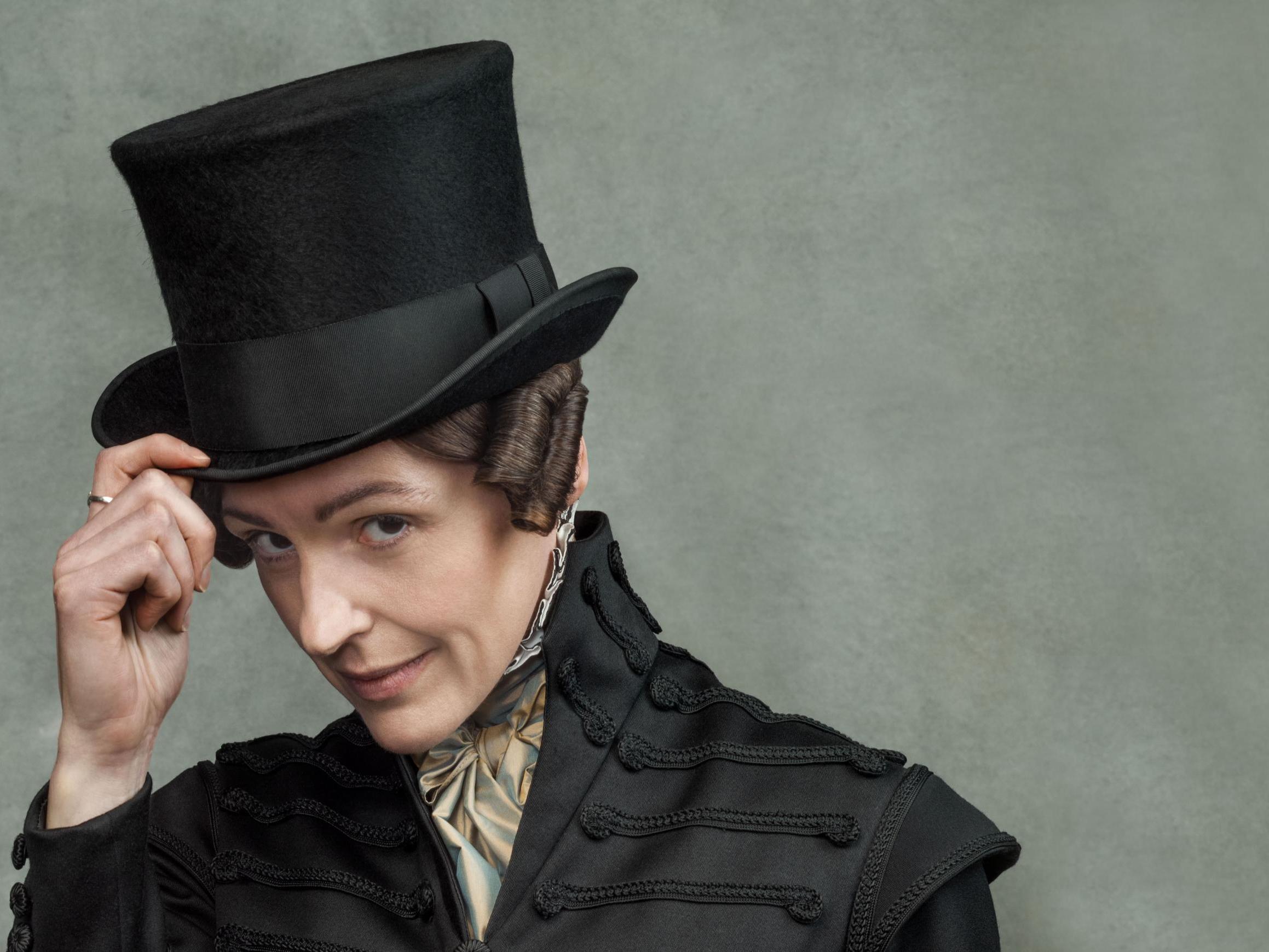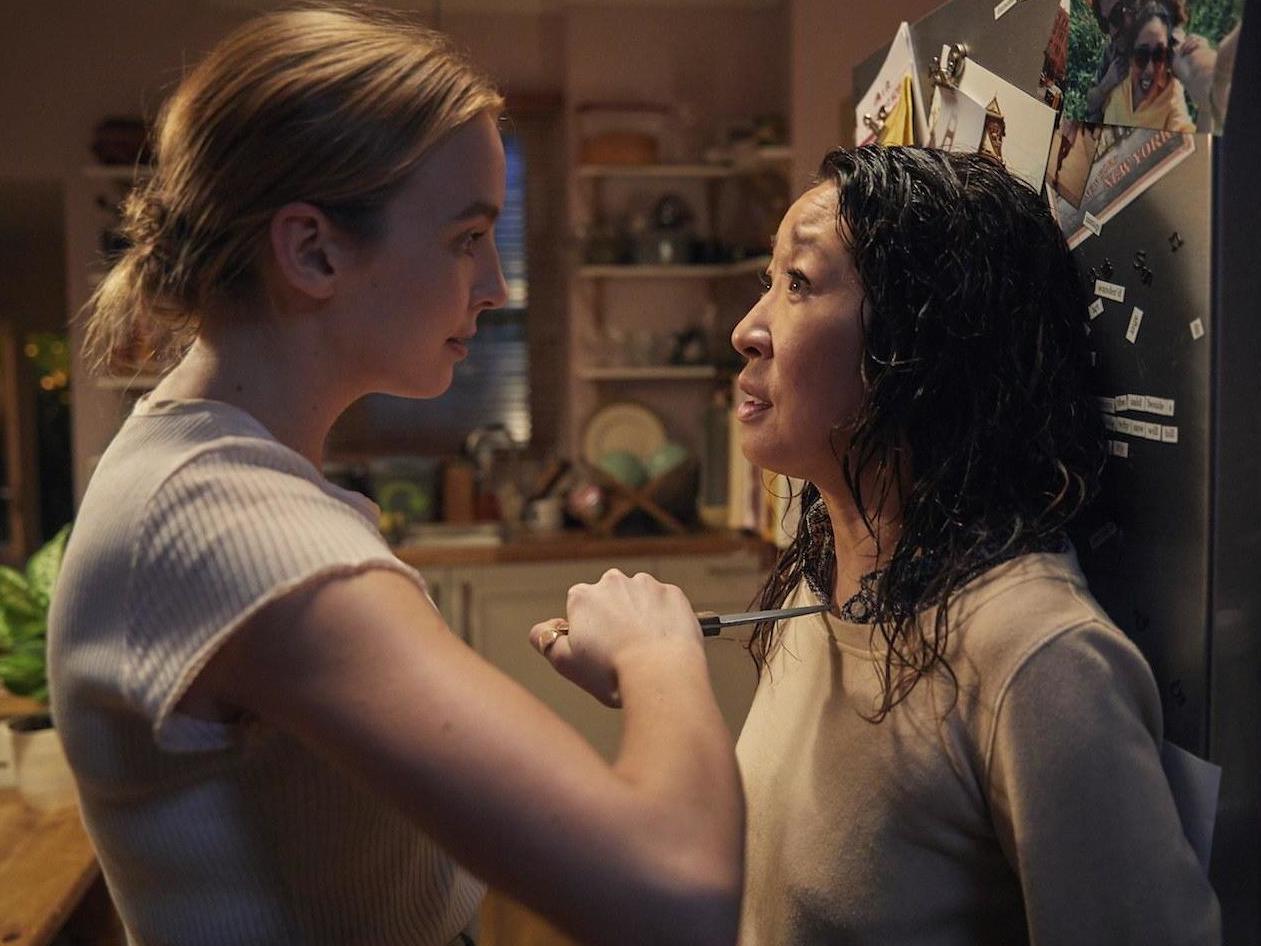From ‘Gentleman Jack’ to ‘Killing Eve’: Why it’s never ‘just a story’ for queer viewers
As Pride month draws to a close, queer characters are at the forefront of media representation more than ever before. But, Payal Dhar explains, LGBTQ+ stories must be about more than just a plotline


The year is 2019 and it’s a really difficult time to be a heterosexual person. As television producers trample over each other in their haste to stick rainbows on their respective shows, the hysterical lesbians and gays stand poised to disrupt the peace the moment one of their their stories – which is all the stories these days – goes south. Straight people’s stories are now the most dispensable on television. Where is a heterosexual supposed to go to find their happily-ever-afters?
All right, let’s be serious for a minute; the proportion of LGBTQ+ characters has gone up on television. Every series worth their name, from soaps to gritty dramas, has their own rainbow corners. In other words, quantity isn’t quite the problem. However, when we analyse the types of stories they are telling, the cracks begin to show.
“Quality versus quantity, what’s positive representation?” asks Kerry-Leigh Fox, queer theorist and fandom studies scholar (“It’s a thing!” she assures me. I don’t need convincing, though television producers might). “Is it… better than nothing?” Nothing may be a rather pathetic benchmark to measure oneself against, but we are talking about a landscape where queer characters have traditionally only existed on the side to prop up their straight counterparts, as comic relief, or to portray a tragic plot of why their love can never overcome life.
Stories about LBGTQ+ people are still the most dispensable on television, and they continue to meet a disproportionate number of sticky ends, with women who love women among the hardest done by. Little wonder then that the queers are angry.
In the first place, television is telling us that we deserve to die, metaphorically speaking, though sometimes literally too. Then, to add insult to injury, as Pride month inches to a close, we note that the most groundbreaking and uplifting queer representation in recent times is based on the real-life dairies of a 19th century lesbian. Where have the last 200 years gone?
Tropes, queer-baiting and actual representation
“Enough with the crumbs – I want the cake!” roared Mona Eltahawy, the African feminist powerhouse, in a New York Times piece, referring to the small matter of dismantling the patriarchy. The rumblings among queer viewers is not dissimilar – the time is past when putting in the token gay or lesbian character, or a throwaway remark about “experimenting in college”, is enough.
Marginalised viewers want well-rounded stories about their lives, not limited to their sexual shenanigans. Gentleman Jack, where Anne Lister’s lesbianism is not the pivot on which the plot revolves, is a refreshing exception to the general rule (no, it was all about proving that you can be butch in a skirt, of course).
Gentleman Jack was not just about bringing her ‘lesbian story’ to life – it was about bringing to life the story of Anne’s wider adventures and experiences as she tells them in her diaries
“Although we were telling the story of Anne Lister’s relationship with Ann Walker, it was also a story based on other aspects of Anne’s remarkable life; as a landowner, as an astute businesswoman, as a traveller,” says Anne Choma, translator of Lister’s diaries, author of Gentleman Jack: The Real Anne Lister, and lead researcher on the series.
“So Gentleman Jack was not just about bringing her ‘lesbian story’ to life – it was about bringing to life the story of Anne’s wider adventures and experiences as she tells them in her diaries. We wanted to portray an image of Anne that would speak freely to a modern audience, but also one that we hoped that she would recognise too. We felt that we wanted to honour the legacy of a bold woman who stayed true to her nature, who consulted her own happiness, and who never wavered from the sexuality that she felt was God-given and an intrinsic part of her identity.”
When LGBTQ+ stories don’t make the effort to be grounded and sensitive, they stop being true representations and become tropes and stories about the sociological other, told by and for the mainstream. A lesson that Sally Wainwright, the creator of Gentleman Jack, learnt the hard way from her show Last Tango in Halifax.
While it’s remembered for the macabre plot device in which a lesbian died the day after her wedding to fix the bereft wife’s relationship with her mother, there was the – possibly even more cringeworthy – “lesbian with a man” trope there to perpetuate yet another “all lesbians have kids”. It was months before Wainwright acknowledged that it had been a mistake. “I wish I had found a better story,” she says. After the delight that was Gentleman Jack, it’s safe to be optimistic – but cautiously – about the new series of Last Tango airing in 2020.

Before Anne Lister captured queer hearts with her iconic stride across the ballroom in an evening gown, a very different kind of game was afoot in Killing Eve between psychopathic killer Villanelle and the MI6 agent tasked with tracking her down, Eve Polastri. Unpopular opinion here, but Killing Eve has always struck a slightly off-kilter chord – not least because of Jodie Comer’s chilling portrayal of Villanelle. While the series itself came in for praise for subverting the male gaze in a story about two women, one of them queer, their publicity material told a different story altogether.
Trailers and posters played up a potential romantic relationship and portrayed the two women in sexualised positions. This was further complicated by Sandra Oh (playing the eponymous Eve), stating in a phone interview to Gay Times, “You guys are tricky because you want to make it into something… but it just isn’t.” When asked for clarification on the charge of queer-baiting and Oh’s comments, a PR representative said: “We are not issuing an official response on that.”
These kinds of tropes and queer-baiting often come as a package, such as “Berena” in Holby City. Ironically, the hit drama series was first off the block with a groundbreaking queer story about a nuanced, authentic and accurate romance between two women, both surgeons, in their 50s, played with crackling chemistry by Catherine Russell, as Serena, and Jemma Redgrave, as Bernie. By the time Holby City picked up a Diva Award for it, Berena was already the benchmark for lesbian representation, hailed as a “transformative experience” and even resulted in “positive mental health outcomes” for the underrepresented demographic it portrayed.
“It has been even harder for us older women to see ourselves [on television],” says 58-year-old solicitor Z, who found herself powerless in the wake of Berena’s charms. “When there are lesbians portrayed they are usually younger and it’s a coming out story. And, cynically perhaps, they are young and beautiful to attract the male viewers’ gaze as well. Here were professional women, living life on their own terms, independent of men, mature and established as respected and excellent in their own fields, who later in their lives found their friendship turning into love and desire, and then daring to be together. They were attractive despite being in their ‘invisible’ 50s. And they were sexual. It made me feel validated as well as represented. I felt, and still feel, much more confident about my entitlement to my own identity, sexual desire, et cetera as a result of this.”
When there are lesbians portrayed they are usually younger and it’s a coming out story. And, cynically perhaps, they are young and beautiful to attract the male viewers’ gaze as well
Z wasn’t alone in choosing to ignore the somewhat disturbing trend of queer-baiting and “foilers” and the buildup of tropes. After a dead-lesbian tease in 2017 and a wedding tease the following year – which actually turned out to be a breakup before Christmas – Holby was suddenly not telling our story any longer. Worse, the show quietly distanced itself from viewers who were hurt, angry and in some cases in mental distress. “An apology that they misjudged the breakup would have helped,” Z admits.
“An acknowledgement that the teasing through spoilers was inappropriate for a vulnerable section of their viewing community. Crikey, if I was having to discuss it with my therapist and struggling with my mental health over it, how were other people not in an understanding [or] supportive relationship/environment coping? My mental health took a battering… I can’t forgive HC for that and no longer watch.”
Z keeps the memory of Berena “safe in fan fiction, where we, who are best qualified to write them” call the shots.
The perceived burden on creators and performers
Before Sandra Oh in Killing Eve hastened to put some space between herself and the insinuation that there may be something “gay” in the series, there was Martin Freeman in Sherlock, and the list doesn’t end with him. Speaking on a radio show earlier this year, Freeman, who plays Doctor Watson, referred to that segment of the fandom who were rooting for JohnLock as “intense” and “challenging”.
“You cannot live up to [their expectations],” he said, “you just can’t.”
The conversation has shifted from being about those represented to those who are representing; about the burden of representation felt by the creators and performers rather than the real experiences of LGBTQ+ audiences.
The rhetoric seems to be that queer fans must be grateful for any visibility (often wrongly referred to as representation) irrespective of the quality or accuracy of the stories. What’s more, queer viewers must take queer-baiting in their stride – it’s “drama” after all – whether or not there is actual queerness involved.
When Rana Habib of Coronation Street died after a factory roof fell on her – though not before she managed to exchange wedding wows with her partner in that semi-squashed state – it was revealed that the actor, Bhavna Limbachia, had requested a dramatic death exit. “It was the only fitting end to the character,” she said in an interview earlier this year. “Kate and Rana had fought so hard to be together … I felt that if they were to be separated, they had to be torn apart and it couldn’t have been their decision. The only way to go was if Rana were to die. Rana would never leave Kate, ever.”
Corrie received wholesale criticism from fans and television pundits alike, and the broadcasting regulator Ofcom received over 200 complaints about the unrealistic and potentially harmful ending to the story. Complaints that they dismissed on the grounds that it was “typical of this soap’s dramatic plotlines and would not have exceeded most viewers’ expectations”.

Viewers brave enough to wade into the complaints process have been met with some baffling responses that would be hilarious if not for the fact that LGBTQ+ people remain at risk even in so-called progressive societies.
The BBC, for example, paints a picture of a “post-homophobic” society when it says, in response to one viewer’s complaint about Berena: “Holby City approaches LGBTQ relationships as it does heterosexual ones … While we note you are unhappy with this story development we don’t believe such a storyline would fall outside the expectations of the majority of viewers.”
Users of the BBC’s extremely convoluted three-step complaints process were dismissed with patronising responses like: “Holby City is a fictional drama, and therefore has to be viewed in this context. We feel that our viewers understand this.” A reply from the BBC’s Executive Complaints Unit said: “I hope I have been able to explain why the offence which was caused was justified by the context.”
The truth is that the actors and producers on these shows are impervious to the hurt and harm their words and choices have caused. Their privilege has left them unable to separate context from content, and remain puzzled by this fandom that seems impossible to please.
Kerry-Leigh Fox raises a pertinent point when she speaks about dealing with intersectionality. Even when the goal remains the same, “how can we bridge the divide between two sides? One camp is too close to the production versus one camp that is too close to the audience.”
The way to bridge the gap is simply greater inclusivity – more stories from more diverse perspectives. Unless production teams can look at the world from every angle, they are not in a position to understand or define diversity, let alone attempt to represent it. Speaking about the making of Gentleman Jack, Anne Choma says: “The team was a diverse one, with a strong ‘gay’ voice influencing and advising on many aspects of the production. Plus, the outpouring of love from the lesbian community around the world cannot be underestimated. I feel this acceptance is not only an indication of [our] success but also a vindication of the fact that two straight women were able to take on the roles of Anne and Ann and portray them in a believable, sensitive and life-affirming way.”
Changing the narrative
When Heather Peace lets Holby City off the hook saying, “Simon Harper … has in my personal opinion put more lesbian characters on TV than any other producer I know, and I want to thank him”, she effectively silences numerous lesbian viewers’ experiences.
Nor does it help when powerful queer people in the media industry, who have the influence to include minority voices and direct the narrative from within, deride the voices protesting unacceptable representation by asking them to find worthier causes: “The #LGBTQ community are fighting against death sentences globally. Is there something more worthy you could maybe put your ‘activism’ into?” This reduces any critique to the equivalent of screaming into the void. This is intersectionality seen from the other end.
“The way things turn out – the way choices are rewarded and punished – is how our culture teaches us what to expect in our own lives,” says Joanna Eleftheriou, who teaches literature and creative writing at the University of Houston in the US. “Narratives can sustain or destroy our ability to hope.” Keeping the faith isn’t an option; there’s work to be done if the hope is to be sustained.
Join our commenting forum
Join thought-provoking conversations, follow other Independent readers and see their replies
Comments